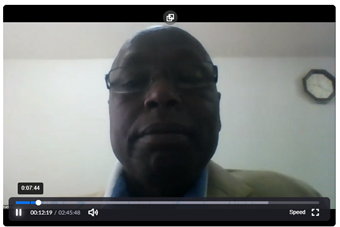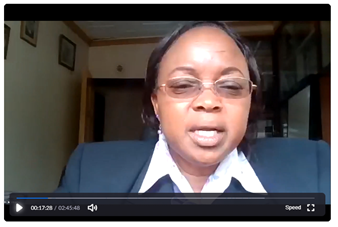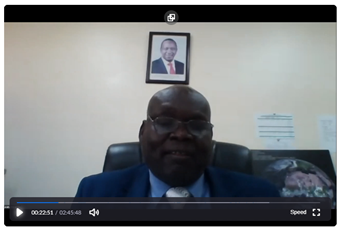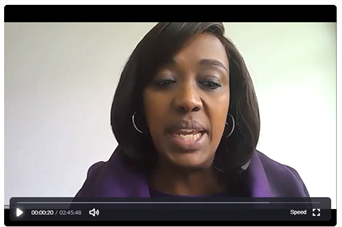You are here: KEFRI Knowledge Base>Main Web>AWebinarOnStaffSensitizationOnDataNeedsDataGaps>AWebinarOnStaffSensitizationOnDataNeedsDataGapsReport (21 Sep 2021, VictorKamau)Edit Attach
A Report on Staff Sensitization on Data Needs, Data Gaps and Way Forward

Acknowledgement
Knowledge Management Unit wishes to acknowledge the KEFRI Director Dr. Joshua Cheboiwo, the Senior Deputy Director Dr. Jane Njuguna, the Deputy Director Forest Research Support Services Dr. Mbuvi, Assistant Deputy Director Mr. Paul Tuwei and Head Knowledge Management Section Ms. Sheila Mbiru for providing logistical support to conduct the sensitization. Mr. David Omuse of ICT is acknowledged for facilitating registration and providing the technology for the webinar. The presenters from: KM Unit – Sheila Mbiru, and Victor Kamau; and Biometrics and GIS section – Celestine Ingutia and Nancy Bor are appreciated. Naomy Kemboi and Rebeccah Nenkai are recognized for facilitating raportouring. Much thanks goes to all 111 participants for attending and making the webinar a success.Introduction
KEFRI being a research institute pays a lot of importance to data as it is the backbone of information and knowledge. Sound decisions, cutting edge science and useful technologies cannot be achieved without appropriately collected, analysed and interpreted data. It was in this background that KM unit in collaboration with Biometrics and GIS section carried out data needs and data gaps identification and documentation in all KEFRI regional programmes between the year 2018 and 2020. The presentation of the findings and sensitization of staff on the same was done through a webinar held on 21st June 2021 with the following objectives:- Presenting the finding of the identification and documentation of data needs and data gaps activity in all KEFRI Regional Programmes
- Sensitization on development of KEFRIs institutional Information Asset Register
- Raising the visibility of KEFRI Scientists and research impact
- An Information Asset Register (IAR) is a catalogue / database of the information an organization holds and processes, where it is stored, how it moves and who has access.
- IAR is important in ensuring security of institution’s information against risks like fire, floods and theft (both physical and cyber theft).
- The team constituted to develop IAR has representation from: Knowledge Management, ICT, Registry and Archives.
- The team has developed tools and has started working on the Main Registry at the headquarters where a total of 127 files were registered in the IAR.
- There are Statutory Regulations that have to be adhered to while developing IAR.
- The challenges experienced so far are: inconsistencies in files names, time consuming and requires a lot of consultation.
- The team is planning to focus next on Electronic Information Assets, sensitizing and training staff and digitising the IAR and make available in a central searchable repository
- There is need of raising the visibility of KEFRI and therefore, Scientists’ CVs are being uploaded on the KEFRI Website.
- Communities of Practices (COPs) is very key in knowledge management and sharing (See Presentation here)
 |  |
| Mr. Tuwei – Assistant Deputer Director, Chairing the Webinar. | Dr. Jane Njuguna – Senior Deputer Director making her opening remarks |
 |  |
| Dr. Joshua Cheboiwo – Director, making his opening remarks | Ms. Sheila Mbiru – Head KM Presenting in the Webinar |
- Data are raw facts and figures that on their own have no meaning. i.e. text, numbers, symbols. Processed data is information, on internalization it becomes knowledge.
- Without data it’s difficult to develop policies, guidelines, technologies and publications.
- KEFRI invests in knowledge Management to provide leadership in collection, storage, access and utilization of data, information and knowledge.
-
Identification and documentation of data needs and data gaps was done at: RVERP on 19th to 22nd March 2018; NFPRP on 23rd – 25th October 2018; CERP on 4th – 9th March 2019; DERP on 11th to 15th November 2019; LVBERP on 18th to 22nd November 2019; and CHERP on 24th April 2020 and 10th June 2020
-
the objective was to: create awareness on data and KM systems among staff; identify and document data needs; identify and document data gaps; and draw insights from the data.
-
the methodology included: a questionnaire that was used to establish the different data needs and gaps; focus group discussions comprising representatives of functional areas were used to obtain additional information; and analysis was done using SPSS. (See Presentation here)
- data needs;
- data availability;
- data storage; and
- data gaps for both R$D and CS. (See Presentation here)
- Readily Available data;
- Partially available data;
- Common Data Needs and Gaps;
- Unique Data Needs And Gaps; and
- Data Storage. (See Presentation here)
- There are a lot of inconsistencies in data files from the registry at headquarters and the regions.
- The summary presented is from a report of a survey conducted where the staff filled questionnaires.
- The gaps and data needs are in tandem with KEFRI mandate.
- Retrieving old data from diskettes to modern storage forms is an expensive process and therefore, there is need to know the value of the old data to be converted.
- Common data tools will be considered
- The indexing of files needs to be updated and in collaboration with national archives.
- The research work should be packaged in various formats that will be accessible to specific stakeholders and in this case as policy briefs as well.
- The team will work on the lifespan of data and statutory requirements for data collection, handling and storage.
- The institute is looking forward to acquire a heavy duty digitizing scanner.
- Data security is looked at in three dimensions: availability, integrity and who has the right to access the data. Therefore, data has to be categorized into public or private while storing it.
- Data that is meant for wide availability can be stored in cloud while data considered being private has to be stored in the data centre depending on its capacity.
- The institute is planning to have a primary data centre at the headquarters and a secondary data centre at Kitui. This is institute information and should be kept private.
- There will be folders in the system where data will be uploaded in various categories like according to thematic areas. The data to be uploaded is KEFRI’s only, and not personal information
- On submitting data in Scientists’ PCs, once the agents are run in the system, they will be able to back up the data to the primary data centre and then back up the data to the secondary data centre. More sensitization will be done.
- There is a clause/ petition that public information should not be stored in cloud but we will try and have highly available data saved in cloud using the proper channels of doing it and not bridging the government policy.
- On integrity issues, there is Segregation of Duty (SOD) Matrix which classifies who to access the data and who should not. This enhances data security as well.
- The work uploaded is date-stamped and time-stamped, meaning the latest version of the work will always be clear. The genesis of the work and who did it will also be displayed.
- On physical verifications, the team is working on the Information Asset Register and once it is done, we will visit the registries and offices for verification.
- The Knowledge Management Section is acquiring a plagiarism software; turnitin
Way Forward
- We should have harmonized data collection tools.
- ICT should capture knowledge/ information produced within the KEFRI internet.
- Information should be packaged into various forms for specific stakeholders.
- The available data should be clustered into different thematic areas.
- Let us shift from using our PCs and use the institute’s devices.
- Digitise all KEFRI publications.
Conclusion
The webinar was well attended as a total of 94 participants were registered. Participants noted that such forums should be planned regulary to update schientis on the data needs and gaps in the institute. The data gaps and data needs identification and documentation should be a regular activity and KM Unit proposes it to be done every three years.Attendance
| Name | User Email | Total Duration (Minutes) | |
| 1 | Jane Menge | jmenge@kefri.org | 304 |
| 2 | George Tonui | gtonui@kefri.org | 211 |
| 3 | KEFRI | domuse@kefri.org | 182 |
| 4 | Riziki Mwadalu | zikiemwa@gmail.com | 180 |
| 5 | Eston Mutitu | estonmutitu@gmail.com | 180 |
| 6 | Gitehi Giathi | giathig@gmail.com | 180 |
| 7 | Victor Kamau | vkamau@gmail.com | 180 |
| 8 | Nellie Oduor | nelliecoduor@gmail.com | 179 |
| 9 | Musingo Tito E. Mbuvi | mtembuvi@gmail.com | 178 |
| 10 | Linus Wekesa | weknus@yahoo.com | 178 |
| 11 | Collins Obonyo | obonyoc@gmail.com | 177 |
| 12 | Sheila Mbiru | sheilambiru@gmail.com | 177 |
| 13 | Susan Wanjiku | swanjiku@kefri.org | 177 |
| 14 | John Otuoma | jmotuoma@kefri.org | 176 |
| 15 | Paul Tuwei | ptuwei@kefri.org | 176 |
| 16 | Rebeccah Nenkai | rebeccah.nenkai@gmail.com | 176 |
| 17 | Jane Njehu | janenjehu1@gmail.com | 175 |
| 18 | Joseph Githiomi | josephgithiomi@ymail.com | 175 |
| 19 | Celestine Ingutia | cingutia@kefri.org | 173 |
| 20 | Chemuku Wekesa | cwekesa@kefri.org | 172 |
| 21 | Benjamin Mukoya | benjaminmukoya@yahoo.com | 172 |
| 22 | Jonah Kiprop | jonahkipsat@gmail.com | 167 |
| 23 | Dr. Joram Kagombe | jokagombe@kefri.org | 167 |
| 24 | Magrate Kaigongi | kaigongim@gmail.com | 166 |
| 25 | Dr. George Muthike | muthikegm@gmail.com | 165 |
| 26 | MARY GATHARA | mwgathara@gmail.com | 165 |
| 27 | Peter kimani | pgachie@yahoo.com | 164 |
| 28 | amina maalim | aminkeyaden@gmail.com | 163 |
| 29 | Bernard Kamondo | bkamondo@kefri.org | 163 |
| 30 | Anthony Macharia | tonymwasi@gmail.com | 163 |
| 31 | Angela Muthama | amuthama@kefri.org | 160 |
| 32 | Ambani Aluha | ambanidenis@gmail.com | 159 |
| 33 | Elema Mohamed | elemah11@gmail.com | 159 |
| 34 | Leila Ndalilo | leylilo@yahoo.com | 156 |
| 35 | Elyas Hassan | eliyas.hassan@gmail.com | 155 |
| 36 | Stephen Ndung'u | sndungu@kefri.org | 155 |
| 37 | Emmanuel Karisa | kengaemmanuel@outlook.com | 154 |
| 38 | Norah koima | nkoima@kefri.org | 154 |
| 39 | jemimah nzilani | maggienzilani@gmail.com | 152 |
| 40 | Mercy Rutto | mrutto@kefri.org | 151 |
| 41 | Vincent Oeba | voeba@kefri.org | 151 |
| 42 | Eugene Olung'ati | eojuku@kefri.org | 150 |
| 43 | Dr. NYAMBATI ROBERT | rnyambati@kefri.org | 150 |
| 44 | Albert Luvanda | luvandaa@gmail.com | 149 |
| 45 | Ernest Kiplangat | nestarono@gmail.com | 149 |
| 46 | Henry Komu | henrymwaka@gmail.com | 149 |
| 47 | Jonathan Njuguna | chegenjugunakarega@yahoo.com | 146 |
| 48 | Nancy Bor | nancyborc@gmail.com | 146 |
| 49 | Violet Oriwo | voriwo@kefri.org | 144 |
| 50 | Flavian Mangoja | mangojaflavian@gmail.com | 143 |
| 51 | Ann Elizabeth | kiluianne@gmail.com | 142 |
| 52 | Nereoh Leley | nereoh24@gmail.com | 142 |
| 53 | Willis Atie | woatie@gmail.com | 139 |
| 54 | Valentor Okul | valvineraks@yahoo.com | 138 |
| 55 | STELLA GATAMA | sgatama@kefri.org | 138 |
| 56 | Evans Cheruiyot | ekibet@kefri.org | 137 |
| 57 | Brian Machote | bmachote@kefri.org | 135 |
| 58 | Gregory Namasaka | gnamasaka@kefri.org | 134 |
| 59 | Jesse Owino | owinojesse@gmail.com | 134 |
| 60 | Joyce Ojino | joyceojino@gmail.com | 134 |
| 61 | joyce okumu | joyce.okumu@gmail.com | 130 |
| 62 | Beryn Otieno | botieno@kefri.org | 128 |
| 63 | James Ndufa | jndufa@kefri.org | 126 |
| 64 | Rachel Kariuki | rwanjiku@kefri.org | 121 |
| 65 | Emily Njagi | mlynjagi@gmail.com | 121 |
| 66 | Patrick Kwiriga | kaupinformat@gmail.com | 121 |
| 67 | George Migom | geomigom2009@gmail.com | 119 |
| 68 | john njoroge | njoroge_09@hotmail.com | 118 |
| 69 | mary mwangi | marymwangi36@yahoo.com | 116 |
| 70 | Roxventa Ongugo | rongugo@gmail.com | 109 |
| 71 | Florence Cherono | ftowett@kefri.org | 105 |
| 72 | Naomy Kemboi | kemboinaomy90@gmail.com | 101 |
| 73 | EUNICE WAKABA | ewakaba@kefri.org | 101 |
| 74 | Faith Rono | faithrono64@gmail.com | 100 |
| 75 | Emmanuel Makatiani | emakatiani@kefri.org | 99 |
| 76 | Esther Manyeki | emanyeki@kefri.org | 99 |
| 77 | George Otieno | gwotieno@kefri.org | 96 |
| 78 | Alice Adongo | adongo.alis@gmail.com | 95 |
| 79 | Asenath Adienge | adiengeasenath@gmail.com | 93 |
| 80 | caroline Gikunda | cgikunda@kefri.org | 92 |
| 81 | Josephine Musyoki | josephinemusyoki@gmail.com | 90 |
| 82 | Samson Ojunga | sojunga@kefri.org | 86 |
| 83 | RASHID MOILE | moilerashid89@gmail.com | 86 |
| 84 | Priscilla Kimani | pkimani@kefri.org | 82 |
| 85 | Stanley Nadir | snadir@kefri.org | 81 |
| 86 | Kibwezi Team Scientists | mikemairura@gmail.com | 78 |
| 87 | Vincent Mosome | vmosome@kefri.org | 74 |
| 88 | Phedister Riziki | phedisterr@gmail.com | 73 |
| 89 | Simon Choge | schoge@kefri.org | 72 |
| 90 | Naftali Kojo | ochungjnaf@gmail.com | 71 |
| 91 | Welimo Martin | mwelimo@gmail.com | 68 |
| 92 | Oliviah Nyaundi | oliviahnyaundi@gmail.com | 67 |
| 93 | George Etindi | gettindi68@gmail.com | 63 |
| 94 | Reuben Shanda | rshanda@kefri.org | 60 |
| 95 | Francis Osia | fosia@kefri.org | 59 |
| 96 | Sylvia Mwalewa | uchisylvia@gmail.com | 54 |
| 97 | Millicent Jepchumba | mjepchumba@kefri.org | 43 |
| 98 | Joshua Cheboiwo | jcheboiwo@kefri.org | 42 |
| 99 | Dr. Jane Njuguna | jwknjuguna@yahoo.com | 42 |
| 100 | RUFO JILLO | rjillo@kefri.org | 39 |
| 101 | FREDRICK OCHIENG | fodhiambo@kefri.org | 38 |
| 102 | Timothy Namaswa | wektim@yahoo.com | 34 |
| 103 | Joram Mbinga | jmbinga@gmail.com | 34 |
| 104 | James Maua | james_maua@yahoo.com | 32 |
| 105 | David Omuse | omusedavid@gmail.com | 29 |
| 106 | Edward Mengich | emengich@kefri.org | 22 |
| 107 | Dr. David Langat | dlangat@kefri.org | 19 |
| 108 | Stephen Ndung'u | sndung'u@kefri.org | 17 |
| 109 | Kigwa Bernard | kigwabk1959@gmail.com | 10 |
| 110 | John Titus | titusndongi@aol.com | 5 |
| 111 | Walter Onyangu | walteronyang@gmail.com | 3 |
Edit | Attach | Print version | History: r8 < r7 < r6 < r5 | Backlinks | View wiki text | Edit wiki text | More topic actions
Topic revision: r8 - 21 Sep 2021, VictorKamau
 Copyright &© by the contributing authors. All material on KEFRI Knowledge Base is the property of Kenya Forestry Research Institute (KEFRI).
Copyright &© by the contributing authors. All material on KEFRI Knowledge Base is the property of Kenya Forestry Research Institute (KEFRI). Ideas, requests, problems regarding KEFRI Knowledge Base? Send feedback


